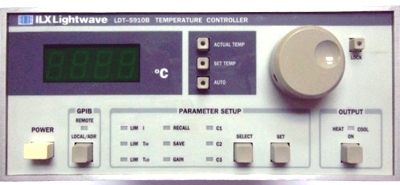
|
|
The ILX LDT-5910B delivers extended temperature control from -99°C to + 150°C with a choice of temperature sensors and TE modules. With a low-noise, 16W, bipolar output, the instrument has the power to drive most loads, yet is quiet enough to handle even frequency-stabilized laser applications. The unique, hybrid proportional/smart integrator control loop delivers fast settling times while maintaining high stability. In addition, the advanced IEEE-488.2 interface option ensures trouble-free remote programming and readout. The instrument also incorporates an automatic shutdown of the unit if a temperature sensor or the TE module should open. Instrument configuration is simplified by using the SELECT and SET controls in conjunction with the main control knob. These controls allow the setting of the sensor calibration constants, the output current limit, high and low temperature limits and the control loop gain. Specifications. Output Type: Bipolar, constant current source. Maximum Output Current: 4 A. Minimum Output Power: 16 W. Compliance Voltage: 4 Volts at 4 A. Current Limit Control Range: 0 to 4000 mA, ±20 mA. Current Limit Accuracy: ±50 mA. Ripple/Noise: <500 uA. Temperature Range: -99°C to + 150°C, -20°C to +50°C w/ 10 kohm thermistor. Short-Term Stability (1 hr.): ±0.005°C or better. Long-Term Stability (24 hr.): ±0.01°C or better. Sensor Types: 2-wire thermistor, AD590 and LM335 IC, and RTD temperature sensor. Thermistor Sensing Current: 10 uA or 100 uA, user selectable. Thermistor Resistance Range: 25 to 450,000 ohm. Display 4-digit, green LED.
|